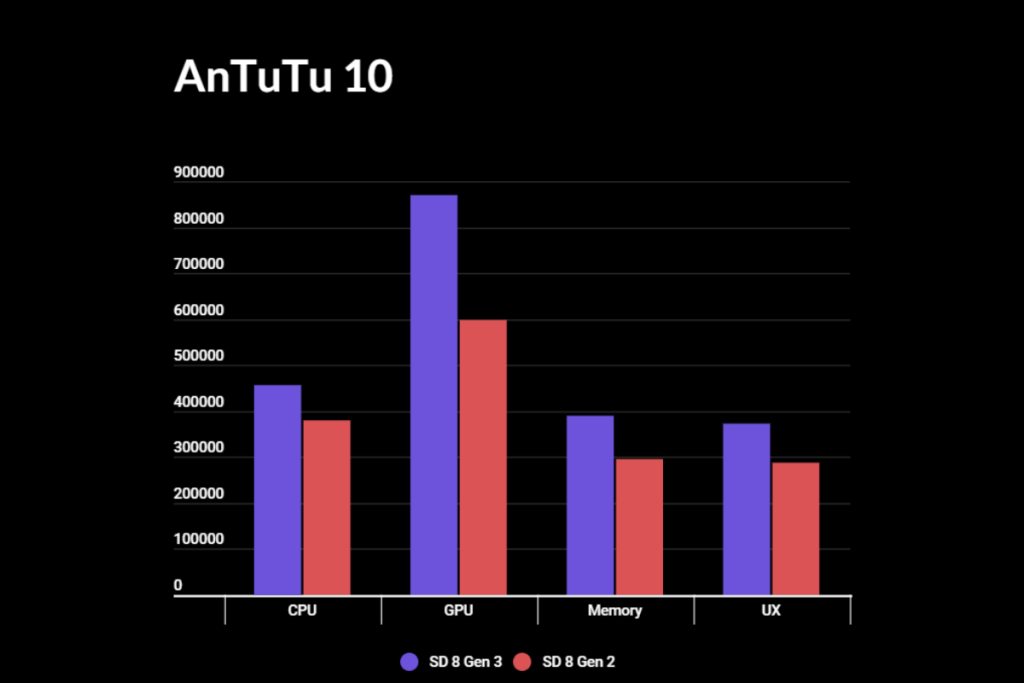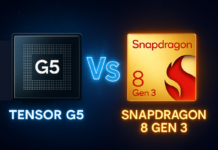Snapdragon 8 Gen 3 and 8 Gen 2 are high-performance smartphone chipsets fabricated using TSMC’s 4nm process. Both chips are already powering many high-end smartphones from major brands, such as Xiaomi and Samsung.
Qualcomm released the Snapdragon 8 Gen 2 in late 2022 and the Snapdragon 8 Gen 3 the following year. With the latest Snapdragon 8 Gen 3, Qualcomm promises major performance and efficiency improvement. But does it really bring an evolutionary upgrade, or is it just an outright overhaul? Let’s compare them to find out the answer.
Snapdragon 8 Gen 3 vs 8 Gen 2: Spec Sheet
| SD 8 Gen 3 | SD 8 Gen 2 | |
|---|---|---|
| Release Date | Oct 2023 | Nov 2022 |
| Process Node | 4nm (TSMC) | 4nm (TSMC) |
| CPU | 1 x Cortex-X4 @ 3.3 GHz 3 x Cortex-A720 @ 3.2 GHz 2 x Cortex-A720 @ 3 GHz 2 x Cortex-A520 @ 2.3 GHz | 1 x Cortex-X3 @ 3.2 GHz 2 x Cortex-A715 @ 2.8 GHz 2 x Cortex-A710 @ 2.8 GHz 3 x Cortex-A510 @ 2.0 GHz |
| GPU | Adreno 750 Snapdragon Elite Gaming Hardware Accelerated Ray Tracing Global Illumination Snapdragon Game Super Resolution Unreal Engine 5.2 MetaHumans Framework | Adreno 740 Snapdragon Elite Gaming Hardware Accelerated Ray Tracing Game Post Processing Accelerators Unreal Engine 5 MetaHumans Framework |
| NPU | Hexagon NPU | Hexagon NPU |
| Memory/Storage | Up to 24 GB RAM LPDDR5X @ 4800 MHz UFS 4.0 storage | Up to 24GB RAM LPDDR5X @ 4200 MHz UFS 4.0 storage |
| Camera | Qualcomm Spectra Triple ISPs (18-bit) Up to 200 MP single camera 108 MP / 64+36 MP / 36+36+36 MP (MFNR, ZSL) | Qualcomm Spectra Triple ISPs (18-bit) Up to 200 MP single camera 108 MP (MFNR, ZSL) |
| Video Recording | 8K @ 30fps, 4K @ 120fps Slow-mo: 720p @ 960fps | 8K @ 30fps, 4K @ 120fps Slow-mo: 720p @ 960fps |
| Display | On-device: 4K Ultra HD @ 60Hz, QHD+ @ 144Hz External: 8K @ 30Hz HDR10, HDR10+, HDR Vivid | On-device: 4K Ultra HD @ 60Hz, QHD+ @ 144Hz External: 4K @ 60Hz HDR10, HDR10+, HDR Vivid |
| Modem | Snapdragon X75 5G Downlink: 10 Gbps Uplink: 3.5 Gbps | Snapdragon X70 5G Downlink: 10 Gbps Uplink: 3.5 Gbps |
| Connectivity | Bluetooth 5.4 Up to Wi-Fi 7 NFC | Bluetooth 5.3 Up to Wi-Fi 7 NFC |
Snapdragon 8 Gen 3 vs 8 Gen 2: Geekbench 6
SD 8 Gen 3:
- Single-core: 2,219
- Multi-core: 6,741
SD 8 Gen 2:
- Single-core: 1,984
- Multi-core: 5,356
The Geekbench test measures the device’s CPU performance. The single-core test measures CPU capabilities when a single core is at work, and the multi-core test shows the combined strength of all cores.
The Snapdragon 8 Gen 3 outperforms its previous generation counterpart by a good margin, living up to Qualcomm’s promise of big performance improvement.
Snapdragon 8 Gen 3 vs 8 Gen 2: AnTuTu

SD 8 Gen 3:
- CPU: 456557
- GPU: 869993
- Memory: 389975
- UX: 372851
- Total score: 2089376
SD 8 Gen 2:
- CPU: 379912
- GPU: 598302
- Memory: 295764
- UX: 287717
- Total score: 1561695
AnTuTu is another popular benchmarking platform that measures the CPU, GPU, memory, and UX performance of a device. Again, the Snapdragon 8 Gen 3-powered device is leading the race by a significant margin.
The latest Snapdragon 8 Gen 3 has over 20% CPU improvements compared to the 8 Gen 2, and the GPU score is up by over 40%. The benchmarks are showing promising results for the Snapdragon 8 Gen 3 chip.
Snapdragon 8 Gen 3 vs 8 Gen 2: Gaming Test
On the popular 3DMark Wild Life gaming benchmark, the Snapdragon 8 Gen 3 scores over 40% higher than the Snapdragon 8 Gen 2. However, not everything is sunshine and rainbows.
The Snapdragon 8 Gen 3 gets a solid start but drops to half of its peak performance within a few minutes on the 3DMark Wild Life Stress Test, whereas the Snapdragon 8 Gen 2’s performance declined gradually over time.
Despite a steep decline at the start, the Snapdragon 8 Gen 3 didn’t lose to its last year’s counterpart. The latest chip also brings 50% performance improvements in ray tracing.
Snapdragon 8 Gen 3 vs 8 Gen 2: What’s Changing?
Qualcomm lived up to its promise with the Snapdragon 8 Gen 3, which offers excellent performance improvements over last year’s chip on the benchmarks. But what’s the reason for this big performance upgrade, and what are other key changes inside the latest Snapdragon 8 Gen 3 chip?
The Snapdragon 8 Gen 3 uses a new set of cores with high performance and efficiency. And all of them run at a higher clock speed. The latest chip also has an upgraded Adreno GPU with over 40% performance uplift.
The Snapdragon 8 Gen 3 has an improved X75 5G modem (vs. X70 5G in the last year’s chip). The new chip supports Bluetooth 5.4, whereas the Snapdragon 8 Gen 2 supports Bluetooth 5.3. Another change the latest Snapdragon chip brings is support for 8K on the outer display (vs. 4K on the Snapdragon 8 Gen 2).
Qualcomm promises major AI upgrades for the Snapdragon 8 Gen 3. It has a Hexagon NPU with nearly double the performance of the NPU inside the Snapdagon 8 Gen 2. The newer chip is 40% more efficient and can run large language models (LLMs) on-device. It can create AI-generated images using stable diffusion in minutes. The Snapdragon 8 Gen 3 introduces support for Dolby HDR photo capture with 10-bit colour depth.
The newer Snapdragon chip has so many AI features and upgrades, but its entirely up to the smartphone makers to implement them. Samsung and Google are aggressively bringing AI features to their latest high-end phones, and other brands are trying to catch up with the growing AI trend.
Snapdragon 8 Gen 3 vs 8 Gen 2: Which Is Better?
The Snapdragon 8 Gen 3 offers impressive CPU and GPU performance upgrades over the Snapdragon 8 Gen 2. It also brings plenty of AI features and upgrades.
Major smartphone brands have already released many devices with the Snapdragon 8 Gen 3 chip and will continue powering most upcoming high-end Android phones this year. However, this won’t make Snapdrgon 8 Gen 2 disappear just yet.
Popular SoCs Comparisons:
1. Snapdragon 8 Gen 3 vs Exynos 2400
2. Snapdragon 8 Gen 3 vs Dimensity 9300
3. Dimensity 9300+ vs Snapdragon 8 Gen 2










Comments